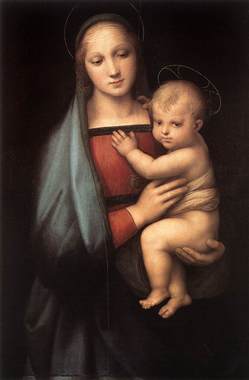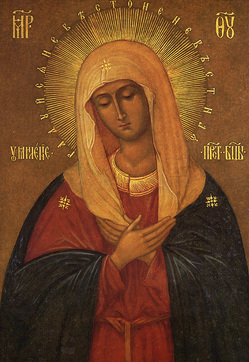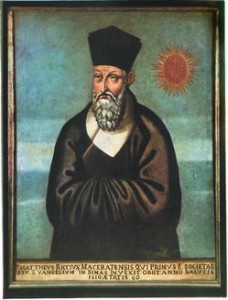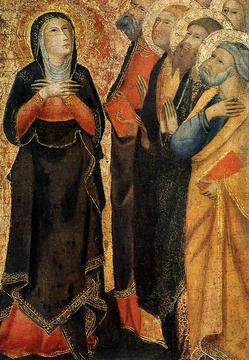 Please pray for the peaceful repose of the soul of the Reverend Father Paul Cioffi, S.J.
Please pray for the peaceful repose of the soul of the Reverend Father Paul Cioffi, S.J.
Saint Augustine on the Ascension of the Lord
We believe in
Jesus whom we have not seen. Those who have seen and touched him with their own
hands, who have heard the word from his mouth, are the ones who have borne
witness to him. It was to teach these things to the world that they were sent
by him. They did not presume to go out on their own initiative. And where did
he send them? You heard the answer to that in the gospel reading: “Go, proclaim
the Good News to every creature under heaven.” The disciples were sent to the
ends of the earth, with signs and wonders accompanying them in confirmation of
their testimony, because they spoke of what they had actually seen.
We believe in
him though we have not seen him, and we await his return. Whoever waits for him
in faith will rejoice when he comes, but those without faith will be put to
shame at the appearance of what they cannot at present see. Then let us abide
in his words, so that his coming may not put us to shame. In the gospel he
himself says to those who have believed in him: “If you persevere in my word,
you will truly be my disciples.” And to their unspoken question, “What will it
profit us?”, he adds: “You will know the truth, and the truth will set you
free.”
At present we
possess our salvation in hope, not in fact; we do not yet possess what we have
been promised, but we hope to do so in the future. The one who promised it is
faithful; he will not deceive you, so long as you wait for his promised gift
without growing weary. The truth cannot possibly deceive. Make sure then that
you yourself are not a liar, professing one thing and doing another; keep faith
with him, and he will keep his word to you. If you do not keep faith, it will
be you who deceive yourself, not he who made the promise.
“If you know
that he is righteous, you can be sure that everyone who acts rightly is born of
him.” Our righteousness in this life comes through faith. None but the angels
are perfectly righteous, and they have only a shadow of righteousness in
comparison with God. Nevertheless, if there is any perfect righteousness to be
found in the souls and spirits created by God, it is in the holy angels who are
good and just, who have not fallen away from God nor been thrust out of heaven
by their pride. They abide forever in the contemplation of God’s word and find
their happiness in nothing apart from him who made them. In these is found the
perfection of righteousness, but in us righteousness has its beginning through
faith, as the Spirit leads us.
VIVIAMO! Summer Camp: “The Drama of Love”
World Youth Alliance (WYA) Europe invites young people from
all over Europe to a 4-day summer camp (June 26- 29, 2009), “The Drama of Love” in a beautiful
mansion in Orleans, France, to learn about and experience love, fulfilment and
the goal and meaning of life. Through different lectures, workshops and movies
we will learn about love and relationships, their potential for problems but
also for fulfilment and happiness, as well as one’s own personality. We will also
explore the wisdom of great literature such as Greek and Roman mythology,
Plato, etc. We will visit Paris and the castles and sights of the Loire valley,
the very place of Renaissance romanticism and acquire journalistic and writing
skills through the composition of a Viviamo magazine.
More information will be
online soon, until then please contact us at iris@wya.net.
Saint Bernardine of Siena
 No other name under heaven has been given to men by which we can be saved.
No other name under heaven has been given to men by which we can be saved.
Father, You gave Saint Bernardine a special love for the holy name of Jesus. By the help of his prayers, may we always be alive with the spirit of your love.
Many people think the IHS symbol originated with and belongs exclusively with the Society of Jesus. The typical Jesuit use of IHS is slightly different from the one used by Bernardine in that the 3 nails are included in the Jesuit monogram. Historically the IHS is an ancient symbol and it was popularized by today’s Saint Bernardine of Siena, the Apostle of Italy or alternatively called the Apostle of the Holy Name.
As a monograph for the name of Jesus Christ it became more popular after the 12th century. We know that Saint Bernard of Clairvaux had a devotion to the Holy Name of Jesus as well as other notable other churchmen and women. Let’s remember that Bernardine suffered great opposition at the hands of the Church for his use devotion and propagation of the Name of Jesus because it was seen as idolatry. By 1530, the Church approved of the Mass text for the feast of the Triumph of the Holy Name of Jesus, celebrated today on January 3, restored to the Roman Missal by Pope John Paul II in 2002. Moreover, there is a long tradition of celebrating the second Sunday of each month as Holy Name Sunday (we did so growing up at St. Stanislaus Church, New Haven, CT).
I would like to recommend membership in The Holy Name Society
One Saint Bernardine’s famous homilies:
 The name of Jesus is the glory of preachers, because the shining splendor of that name causes his word to be proclaimed and heard. And how do you think such an immense, sudden and dazzling light of faith came into the world, if not because Jesus was preached? Was it not through the brilliance and sweet savor of this name that God called us into his marvelous light? When we have been enlightened, and in that same light behold the light of heaven, rightly may the apostle Paul say to us: Once you were darkness, but now you are light in the Lord; walk as children of light.
The name of Jesus is the glory of preachers, because the shining splendor of that name causes his word to be proclaimed and heard. And how do you think such an immense, sudden and dazzling light of faith came into the world, if not because Jesus was preached? Was it not through the brilliance and sweet savor of this name that God called us into his marvelous light? When we have been enlightened, and in that same light behold the light of heaven, rightly may the apostle Paul say to us: Once you were darkness, but now you are light in the Lord; walk as children of light.
So this name must be proclaimed, that it may shine out and never be suppressed. But it must not be preached by someone with sullied mind or unclean lips, but stored up and poured out from a chosen vessel. That is why our Lord said of Saint Paul: He is a chosen instrument of mine, the vessel of my choice, to carry my name before the Gentiles and kings and the sons of Israel. In this chosen vessel there was to be a drink more pleasing than earth ever knew, offered to all mankind for a price they could pay, so that they would be drawn to taste of it. Poured into other chosen vessels, it would grow and radiate splendor. For our Lord said: He is to carry my name.
When a fire is lit to clear a field, it burns off all the dry and useless weeds and thorns. When the sun rises and darkness is dispelled, robbers, night-prowlers and burglars hide away. So when Paul’s voice was raised to preach the Gospel to the nations, like a great clap of thunder in the sky,
his preaching was a blazing fire carrying all before it. It was the sun rising in full glory. Infidelity was consumed by it, false beliefs fled away, and the truth appeared like a great candle lighting the whole world with its brilliant flame.
By word of mouth, by letters, by miracles and by the example of his own life, Saint Paul bore the name of Jesus wherever he went. He praised the name of Jesus at all times, but never more than when bearing witness to his faith. Moreover, the Apostle did indeed carry this name before the Gentiles and kings and the sons of Israel as a light to enlighten all nations. And this was his cry wherever he journeyed: The night is passing away, the day is at hand. Let us then cast off the works of darkness and put on the armor of light; let us conduct ourselves honorably as in the day. Paul himself showed forth the burning and shining light set upon a candlestick, everywhere proclaiming Jesus, and him crucified.
And so the Church, the bride of Christ strengthened by his testimony, rejoices with the psalmist, singing: “God, from my youth you have taught me, and I still proclaim your wondrous deeds. The psalmist exhorts her to do this, as he says: Sing to the Lord, and bless his name, proclaim his
salvation day after day. And this salvation is Jesus, her savior.”
From a sermon by Saint Bernardine of Siena
Sermo 49, De glorioso Nomine Iesu Christi, cap 2: Opera omnia, 4. 505-506
Vatican becomes better tech friendly
For the 43rd World
Communications Day the Vatican has rolled out some new tech initiatives. The Pontifical Council for Social Communications has been working overtime these days to bring the Church into the 21st century via technology.
See the
following:
Some resources for pastor
types
The Pope’s
address for the Communications Day on May 24th: “New
Technologies, New Relationships: Promoting a culture of Respect, Dialogue and
Friendship“
Pope2You (to be officially launched Thursday)
Plus there is
The Vatican on YouTube
iBreviary (available from iTunes for the iPhone for a $1.00, in English & Italian)
For your iPhone there is an application for a Jewish Prayerbook
Damian Thompson acknowledges that slop is all we seem to get when it comes to liturgical music
Damian Thompson’s blog entry the other day on trendy liturgical music is right on but I can only bring myself to say, no kidding. Saying that the “liturgists” have made our liturgical life a laughing-stock is correct but it’s clearly an understatement and patently too polite. In my mind the poor state of the Liturgy has driven more people away than we care to admit.
What does the Church say about the liturgical memorial of Blessed Virgin Mary?
 This most Holy Synod [Vatican II] deliberately teaches this
This most Holy Synod [Vatican II] deliberately teaches this
Catholic doctrine and at the same time admonishes all the sons of the Church
that the cult, especially the liturgical cult, of the Blessed Virgin, be
generously fostered, and the practices and exercises of piety, recommended by
the magisterium of the Church toward her in the course of centuries be made of
great moment, and those decrees, which have been given in the early days
regarding the cult of images of Christ, the Blessed Virgin and the saints, be
religiously observed. But it exhorts theologians and preachers of the
divine word to abstain zealously both from all gross exaggerations as well as
from petty narrow-mindedness in considering the singular dignity of the Mother
of God. Following the study of Sacred Scripture, the Holy Fathers, the
doctors and liturgy of the Church, and under the guidance of the Church’s
magisterium, let them rightly illustrate the duties and privileges of the
Blessed Virgin which always look to Christ, the source of all truth, sanctity
and piety. Let them assiduously keep away from whatever, either by word or
deed, could lead separated brethren or any other into error regarding the true
doctrine of the Church. Let the faithful remember moreover that true devotion
consists neither in sterile or transitory affection, nor in a certain vain
credulity, but proceeds from true faith, by which we are led to know the
excellence of the Mother of God, and we are moved to a filial love toward our
mother and to the imitation of her virtues. (Lumen gentium, 67)
Cashing-in the work of the Church
Are we committed to beauty and truth in art? Thinking about
Dan Brown’s books which contains Catholic “material” I have been a bit
distressed at some peoples’ an uncritical acceptance of what I think is mostly
scandalous regarding the Catholic faith. To me it is not OK because Brown is,
as it’s said belowi, cashing in on the work of the Church. But my gripe is that
fiction is always received as such by some people aren’t able to clearly
discern the meaning of things. That is, there are people who can’t separate
fact from fiction in printed materials; for them anything in print is true.
Right, it’s ludicrous but people do think that what Dan Brown writes is true
and beyond reproach. Father John Wauck, an Opus Dei priest, is a professor at
the Pontifical University of the Holy Cross, and the author of the blog
“The Da Vinci Code and Opus Dei” said the following recently in an
interview the rest of the interview was published on Zenit.org.
Dan Brown’s
trying to sell books by offering a “cocktail” of history, art,
religion and mystery, and, in today’s world, there seems to be only one place
where he’s able to find all those things together: in the Roman Catholic
Church. In fact, he’s cashing in on the culture of the Church.
Universities are
an invention of the Church. Copernicus was a Roman Catholic cleric, and he
dedicated his book on the heliocentric universe to the Pope. The calendar we
use today is the Gregorian Calendar, because it was promulgated by Pope Gregory
XIII, who was working with the best astronomers and mathematicians of his time.
Galileo himself always remained a Catholic, and his two daughters were nuns.
One of the greatest Italian astronomers of the 19th century was a Jesuit
priest, Angelo Secchi. The father of modern genetics, Gregor Mendel, was a
Catholic monk. The creator of the “Big Bang” theory was a Belgian
priest, Georges Lemaitre.
In short, the idea that there is a some natural tension between science and the Church, between reason and faith, is utter nonsense. Nowadays, when people hear the words “science” and “the Church,” they immediately think of Galileo’s trial in the 1600s. But, in the larger scheme of things, that complex case –which is frequently distorted by anti-Catholic propagandists–was a glaring exception. There’s a reason why critics of the Church are always brings it up: It’s the only example they’ve got. So, when we hear the words “science” and “the Church,” we should think Copernicus, Secchi, Mendel and Lemaitre. They’re representative. Galileo’s trial is not.
Consider living according to the virtues of Mary, Mother of God
 …true devotion to our Lady is holy, that is, it leads
…true devotion to our Lady is holy, that is, it leads
us to avoid sin and to imitate the virtues of Mary. Her ten principal virtues
are: deep humility, lively faith, blind obedience, unceasing prayer, constant
self-denial, surpassing purity, ardent love, heroic patience, angelic kindness,
and heavenly wisdom.
Blessed Mother
Matteo Ricci: 4th centenary of death
 We’re observing the anniversary of death of the famed Jesuit, Matteo Ricci. Benedict XVI wrote to Bishop Claudio Giuliodori of Macerata-Tolentino-Recanati-Cingoli-Treia, Italy on the occasion of a Jubilee Year commemorating the fourth centenary of the death of the Jesuit Father Matteo Ricci, who died in Beijing, China on 11 May 1610. In part the Pope said:
We’re observing the anniversary of death of the famed Jesuit, Matteo Ricci. Benedict XVI wrote to Bishop Claudio Giuliodori of Macerata-Tolentino-Recanati-Cingoli-Treia, Italy on the occasion of a Jubilee Year commemorating the fourth centenary of the death of the Jesuit Father Matteo Ricci, who died in Beijing, China on 11 May 1610. In part the Pope said:
In considering his intense academic and spiritual activity, we cannot but remain favourably impressed by the innovative and unusual skill with which he, with full respect, approached Chinese cultural and spiritual traditions. It was, in fact, this approach that characterised his mission, which aimed to seek possible harmony between the noble and millennial Chinese civilisation and the novelty of Christianity, which is for all societies a ferment of liberation and of true renewal from within, because the Gospel, universal message of salvation, is destined for all men and women whatever the cultural and religious context to which they belong.
A biography of Father Ricci can be read here.
More about Father Ricci can be found here and here.
For those with a deeper curiosity I could recommend Jonathan D. Spence’s The Memory Palace of Matteo Ricci.
